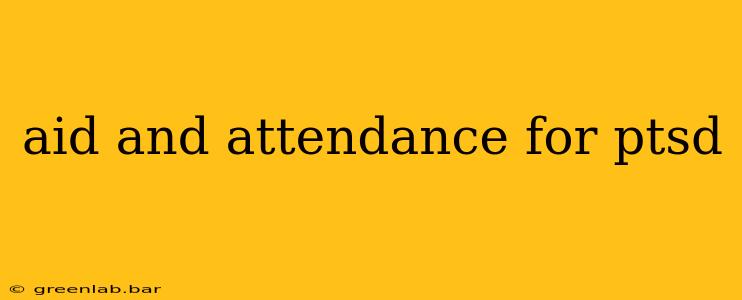Post-Traumatic Stress Disorder (PTSD) significantly impacts the lives of veterans and their families. The emotional, psychological, and often physical toll can make daily living incredibly challenging. Fortunately, the Department of Veterans Affairs (VA) offers the Aid and Attendance benefit to help alleviate some of the financial burden associated with PTSD and other qualifying conditions. This comprehensive guide will explore the Aid and Attendance benefit, its eligibility requirements, and the application process.
Understanding Aid and Attendance
Aid and Attendance is a supplemental benefit available to veterans and their surviving spouses who meet specific criteria. It's designed to provide financial assistance with the cost of care related to aging or disabilities. While many associate it with aging veterans requiring in-home care, it's also crucial for veterans battling PTSD whose symptoms severely impact their ability to manage daily life.
How PTSD Qualifies for Aid and Attendance
PTSD, if severe enough, can qualify a veteran for Aid and Attendance. The key is demonstrating that the PTSD significantly impacts your ability to perform activities of daily living (ADLs). These ADLs include:
- Dressing: Difficulty dressing oneself due to tremors, anxiety, or other PTSD-related symptoms.
- Eating: Struggling to eat independently due to flashbacks, nightmares, or related issues.
- Bathing: Inability to bathe or shower without assistance because of PTSD symptoms.
- Toileting: Needing help with toileting due to PTSD-related challenges.
- Continence: Experiencing incontinence issues related to PTSD.
- Mobility: Significant limitations in mobility due to PTSD-related anxiety or physical symptoms.
The VA will assess the severity of your PTSD and its impact on your daily life. Medical evidence, including doctor's statements, therapy records, and hospitalizations, will be crucial in demonstrating your need for assistance. Simply having a PTSD diagnosis isn't enough; the impact of the PTSD on your daily functioning is the critical factor.
Eligibility Requirements for Aid and Attendance
To qualify for Aid and Attendance, you must meet several requirements:
- Veteran Status: You must be a veteran who served honorably.
- Unreimbursed Medical Expenses: While not always strictly required, significant unreimbursed medical expenses related to your care can strengthen your application.
- Need for Personal Care: You must demonstrate a need for regular personal care assistance due to age, disability, or illness—with PTSD playing a significant role in this need.
- Income and Asset Limits: There are income and asset limits for Aid and Attendance. These limits are adjusted annually and vary based on marital status. It's crucial to check the current limits on the VA website. (Note: We do not provide links to official websites here).
- Pension Eligibility: You generally need to be eligible for a VA pension to receive Aid and Attendance.
The Application Process
Applying for Aid and Attendance can be complex. It's recommended to gather all necessary documentation beforehand, including:
- Discharge papers (DD214): Proves your veteran status and service history.
- Medical records: Demonstrates the severity of your PTSD and its impact on daily living. This includes therapist notes, hospital records, and doctor's statements.
- Financial documents: Proof of income and assets is necessary to meet the eligibility requirements.
The application process typically involves completing VA Form 21-526EZ and submitting it with supporting documentation. You can find this form (and information on updates) through official VA channels. Consider seeking assistance from a Veterans Service Officer (VSO) to navigate the complexities of the application process. They can provide valuable support and ensure your application is complete and accurate.
Maximizing Your Chances of Approval
To increase your chances of approval, ensure your application is meticulously prepared. Clearly articulate how your PTSD affects your daily life and requires personal care assistance. The more comprehensive and detailed your documentation, the stronger your application will be. Working closely with your doctor and therapist to obtain detailed supporting statements is highly recommended.
Beyond the Financial Assistance
Aid and Attendance is more than just financial assistance; it’s a lifeline for many veterans struggling with PTSD. The financial relief it provides allows veterans to focus on their health and well-being, improving their quality of life. The peace of mind knowing that financial burdens are somewhat alleviated can greatly benefit recovery efforts. This benefit helps veterans and their families live with dignity and receive the support they deserve.
Disclaimer: This information is intended for educational purposes only and should not be considered legal or medical advice. Always consult with the VA or a qualified professional for accurate and up-to-date information regarding Aid and Attendance benefits and eligibility requirements. The information provided here is subject to change, and it is crucial to refer to official VA sources for the most current details.

